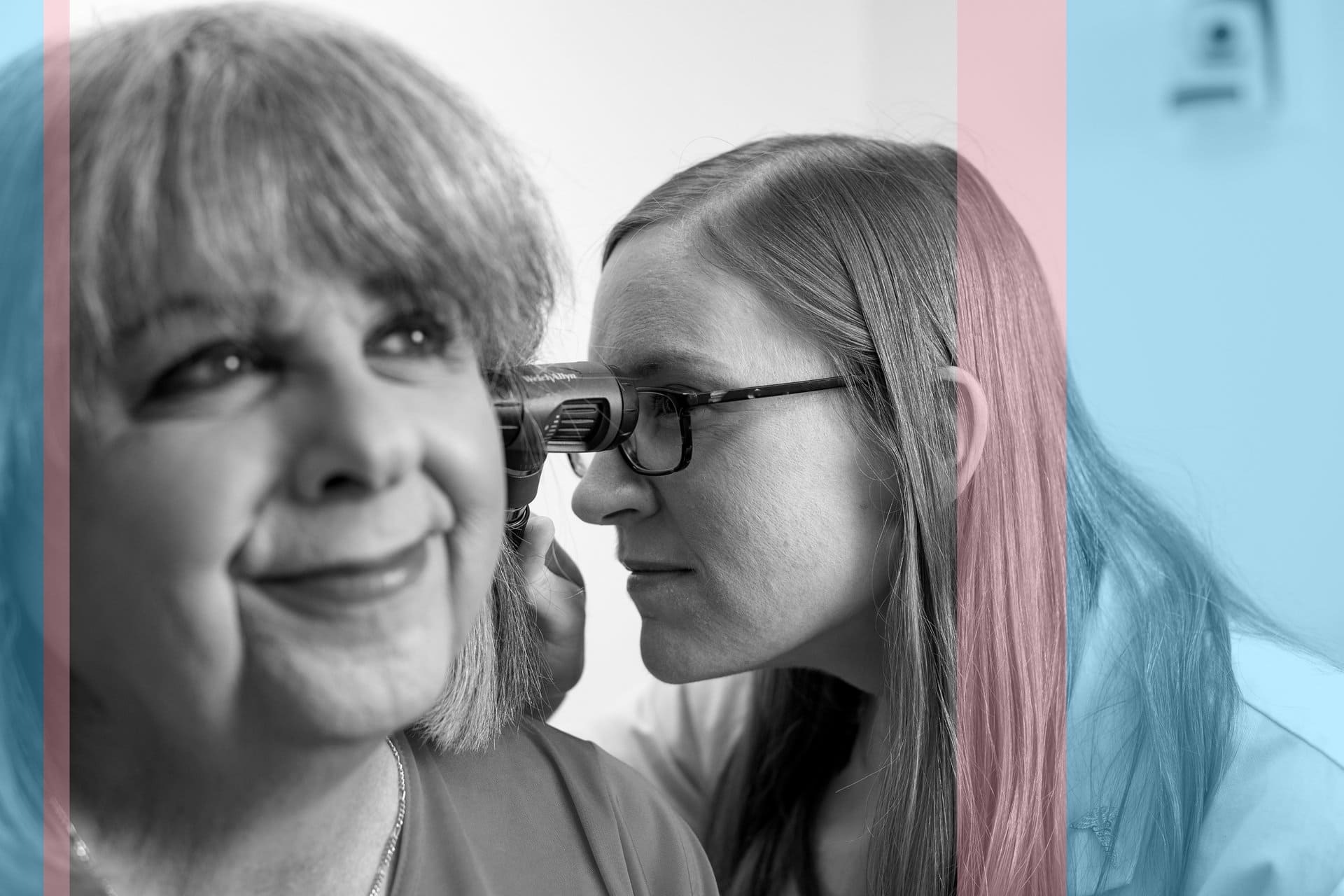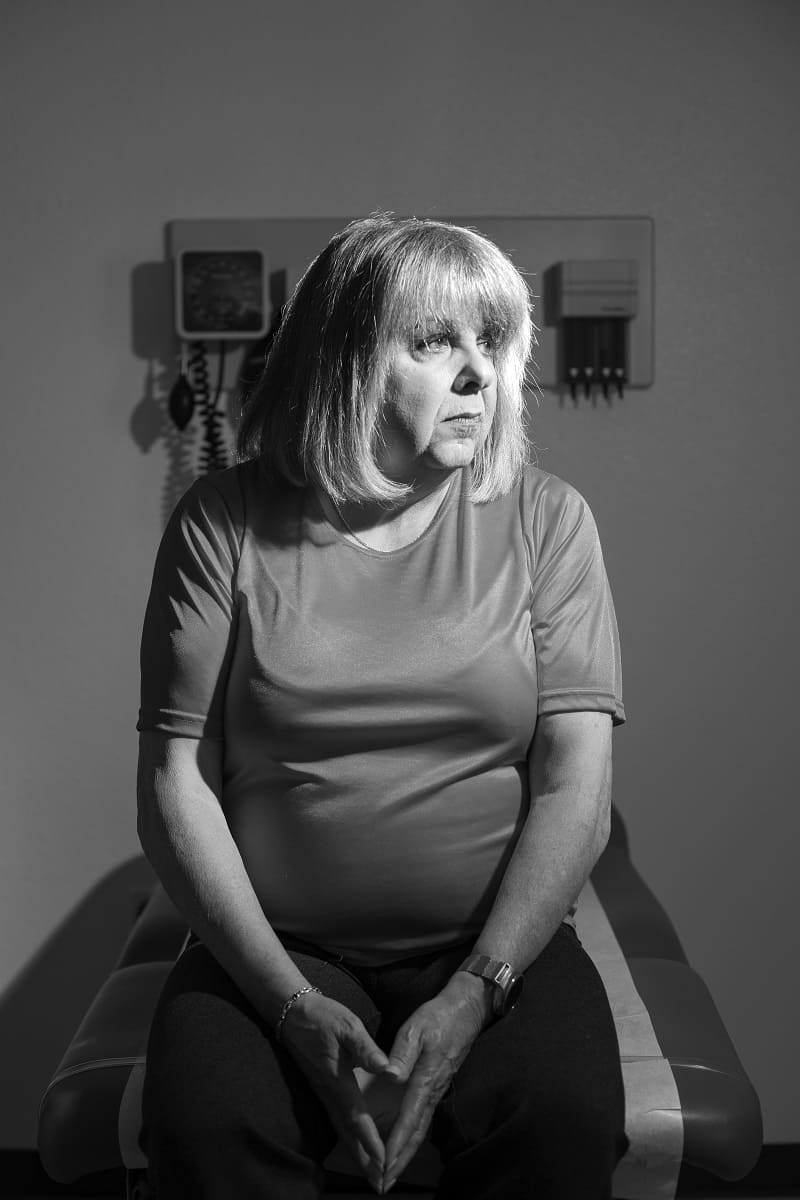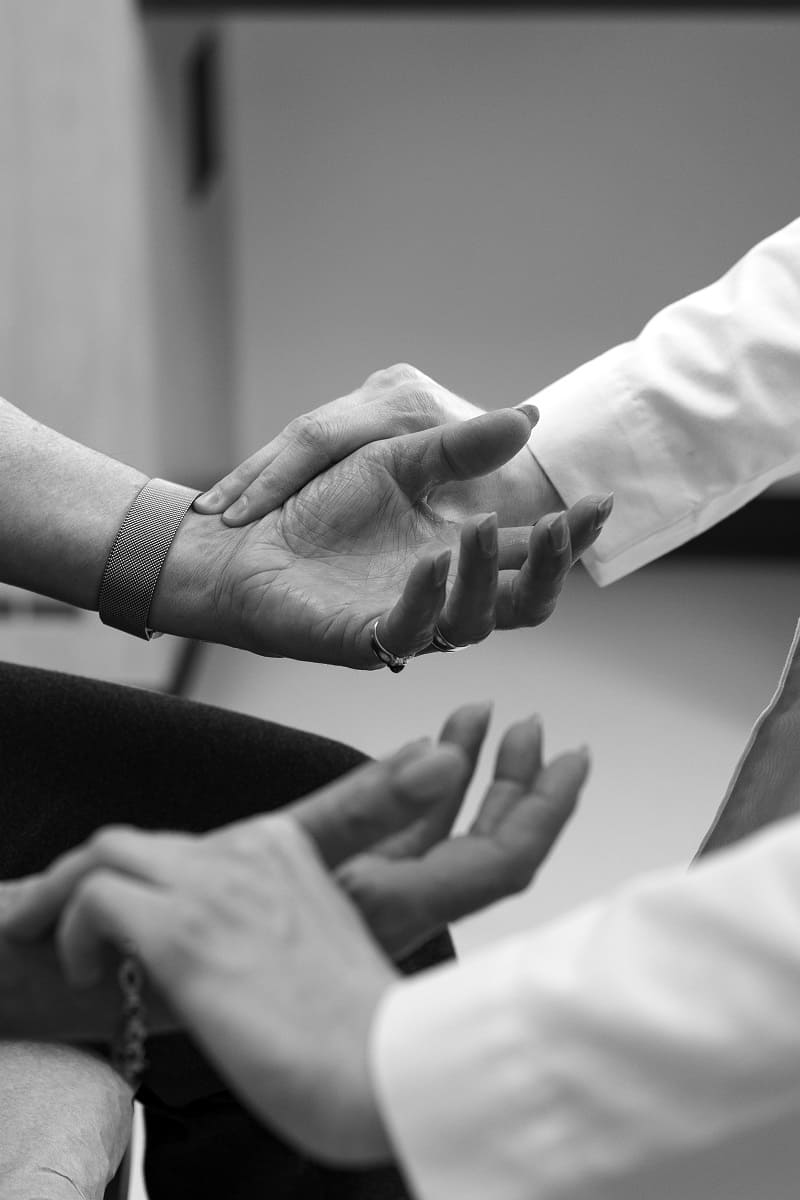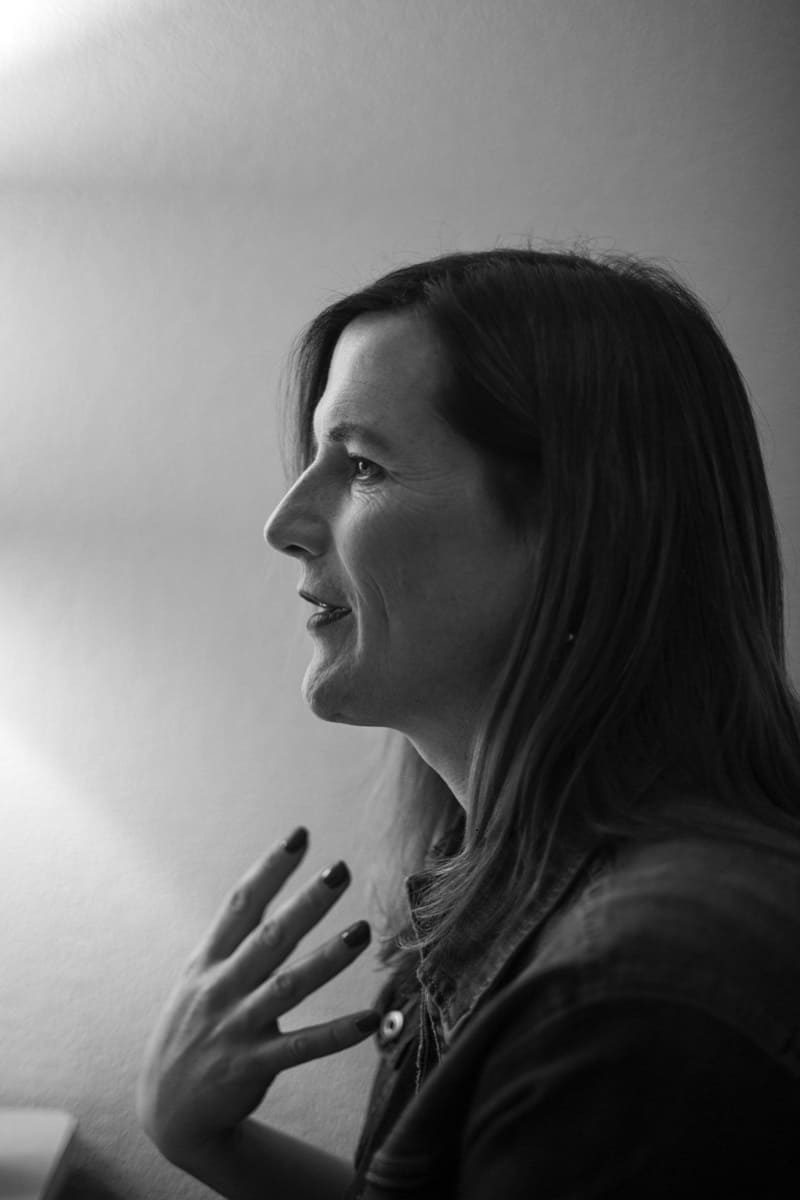NevadaToday
In Transition The transgender community waits for health care to catch up

In Transition
As a standardized patient, Sherrie Scaffidi (left) assists in the training of the medical students like Taylor Howard, M. D. '19 (right).
A group of first-year medical students sits before a panel of invited guests. It’s part of a daylong Practice of Medicine workshop focused entirely on LGBTQIA health care. The first panelist, a transgender woman, starts things off. "How many of you," she begins, scanning the room, "have had to call at least a dozen different doctors’ offices just to see if anyone would even take someone like you as a patient?"
The room falls silent. Students look uncomfortably around the room. The importance of this dedicated day of learning has already hit home for these aspiring physicians-to-be. It’s a glimpse into a nationwide epidemic: the gaping disparity between the number of transgender individuals who need health care and the number of providers who can and will care for them knowledgeably and respectfully.
As of 2016, 1.4 million adults identified as transgender, according to a study by the Williams Institute at the UCLA School of Law. Statistically, as members of the LGBTQIA (lesbian, gay, bisexual, transgender, questioning and/or queer, intersex, asexual and/or ally) community, they are more likely to attempt suicide, be homeless, be overweight or obese, suffer mental health issues and have the highest rates of tobacco, drug and alcohol use.
Despite all this, they are also far less likely than cisgender individuals (those whose gender identities align with their birth sex) to seek medical treatment, according to an NPR survey. Twenty-two percent say they have avoided doctors or health care out of fear of discrimination, and 31% have no regular doctors or form of health care.
Meanwhile, only about a third of medical students feel adequately trained to provide patients with sexual health information, according to a University of Vermont College of Medicine study. And as of 2018, more than half (52%) of medical schools in the U.S. still provided no transgender education at all.
Fortunately, northern Nevada is ahead of the curve. Thanks to the dedication of faculty, staff and students in a variety of disciplines, the University of Nevada, Reno School of Medicine houses a number of ambitious initiatives to meet the needs of the transgender community and close this health care gap.
Curricular Focus
When David J. Howard M.D. ’04, Ph.D., was a medical student, there was no training offered to students in the treatment of transgender patients. "I think I was very well educated, but that wasn’t part of anybody’s curriculum at the time, so I think we’ve made some progress," he said.
Today, as a board-certified endocrinologist, Dr. Howard is an associate professor at UNR Med and director of curricular operations for medical student education in years one and two, and he’s closely involved in helping make that progress.
First-year medical students now participate in a daylong intensive program comprised of two hours of lecture — one on sexual orientation in medicine and another on transgender health — followed by three hours of practical content, during which students take part in peer-led training in sexual history-taking of transgender patients, peer-led transgender case studies involving LGBTQIA issues, Safe Zone training and a panel discussion with LGBTQIA patients and providers. Howard is also working to fold more non-binary patients, patients with gender identities that are not exclusively masculine or feminine, into the school’s Case of the Week programming.
The lectures are led by Howard and Nicole Jacobs, Ph.D., a clinical psychologist, associate professor in UNR Med’s department of psychiatry and behavioral sciences and associate dean of diversity and inclusion for the School of Medicine, who focuses on culturally sensitive history-taking and discussions.
Medical student Rodel Maulit leads a discussion with his peers.
These ideas are extended in the Safe Zone training, derived from The Safe Zone Project, a national program for LGBTQIA awareness and ally training. Jacobs explained that she and colleagues have adapted the national program specifically for health care providers.
"We talk about pronoun use, terminology, phobias, how sexual orientation is different from gender expression and how that affects identity... We also talk about what they can do to provide a good patient experience, from the moment the patient parks in their lot to what forms they will fill out and whether there will be options for them in terms of selecting gender or preferred names. We talk about the kind of service they will offer and what it must be like being someone who has to make multiple phone calls to find a doctor’s office that will even accept or treat them."
Jacobs says that the interactive components of the training, the panel and case studies, are particularly powerful in helping medical students to see the impact on patients. Panels may include members of the LGBTQIA community, providers and other knowledgeable professionals from the area.
We know that people from LGBTQIA populations tend to delay or forego health care because of some of the biases they encounter when they're trying to get care
"We want students to hear about doctors who aren’t quite up to par or aren’t sensitive and what kind of impact that has. We know that people from LGBTQIA populations tend to delay or forego health care because of some of the biases they encounter when they’re trying to get care," Jacobs said.
Exposure to transgender education doesn’t stop after year one. Kathryn Eckert M.D. ’89, a pediatric endocrinologist and associate professor at UNR Med, is one of the few providers prescribing puberty blockers and gender-affirming hormones to pediatric transgender patients in the community.
"I think we really need to have more providers who are trained in that area, in mental health as well as [hormone therapies]," Dr. Eckert said, adding that training shouldn’t be limited to endocrinologists, since many different providers will at some point encounter the effects of prescribed hormone therapies.
Fortunately, her work informs the curriculum, and as pediatric clerkship director, she ensures that students in their last two years of medical training are exposed to transgender education. The vast majority of students who rotate through her clinic, she says, will see at least one patient with transgender issues.
Jacobs also points out another aspect of the training continuum: During orientation, at the beginning of year one and twice more during medical school, all students take assessments of implicit bias, which measures their biases about a variety of demographics, including LGBTQIA. Drawing on those results, students are taught how to manage their biases and reconcile them with their explicit values through a peer-led, interactive curriculum created specifically by and for UNR Med based on Acceptance and Commitment Training (ACT), an internationally known, evidence-based program co-created by Steven Hayes, Ph.D., foundation professor in the University’s department of psychology, and adapted for use with medical students in collaboration with the University’s Performance Systems Technologies Lab, led by Behavior Analysis Program Director Ramona Houmanfar, Ph.D.
"I don’t think other medical schools are doing this kind of thing. We’ve actually created a program where it’s part of the curriculum, it’s longitudinal and we have measures that say we’ve taken assessments of implicit bias at orientation, at the end of year two and again in year four," Jacobs said. "I think I can pretty confidently say that we’re on the cutting edge of that."
Real-World Encounters
UNR Med students also work with standardized patients, community members who, following provided scripts, present as real patients to the medical students.
"I think one of the strengths of our program is that students get early exposure to patient care," Howard said. "So within two weeks, they’re having to interview patients and ask them these really difficult questions about their religious beliefs and end-of-life care and sexual practices. It’s very important for them to get used to asking those questions ... If you can be comfortable with the population, it makes a huge difference to them, and they can be more comfortable with you as well."
One such standardized patient is Sherrie Scaffidi, a 69-year-old transgender woman from Carson City who is active in transgender advocacy in the community, as president of Parents, Families and Friends of Lesbians and Gays (PFLAG) Carson City Region, a volunteer with Northern Nevada HOPES and a board member with the lobbying organization Transgender Allies Group (TAG). Scaffidi was approached by a fellow HOPES volunteer about an opening at UNR Med for a standardized patient and was enthusiastic about the opportunity to help educate future doctors, having experienced her own difficulties in the health care world.


"Many doctors don’t know and have not been taught how to care for transgender patients," Scaffidi said. "My GP, a young woman, recently said to me, ‘I’ll gladly fill your hormone prescriptions, but if we have to make any changes, I don’t know how to do that.’ By doing this with the School of Medicine, we’re getting those students who are going to be doctors exposed to treating transgender patients, so maybe down the road the patient won’t have to teach the doctor how to care for us."
She insists to UNR Med students that no questions are off limits if it benefits their learning. For her part, she won’t hesitate to politely correct their occasional missteps in the interest of education.
"It’s interesting to see how they react to me, the questions they’ll ask, and whether they do so in a respectful manner," Scaffidi said. "One time, they kept asking, ‘So how are you doing with your transformation?’ That’s not a term we use; I’m not transforming into anything, I’m transitioning. I had to tell them, ‘You don’t want to use that term.’ So it opens their eyes as far as how to interact with certain types of people."
Student-led Efforts
Last year was the first to include peer-led discussions on sexual history-taking and case studies. Rodel Maulit, a medical student pursuing a scholarly concentration in medical education, has worked closely with Jacobs to study the outcomes of peer-led activities on students’ attitudes and self-efficacy in caring for these patient populations, as a means for improving the UNR Med curriculum. Pre- and post-assessments from 2018 indicated an increase in improvement of attitudes and knowledge about working with LGBTQIA patients.
"We thought perhaps if it was done in a peer-led fashion, it would remove some of the stigma and help people feel more comfortable talking about some of these subjects," Jacobs said. "We haven’t empirically tested the question, but I think Rodel is able to make students feel comfortable and ask questions in a way they might not if faculty were leading it."
Students also are taking the lead in other ways to ensure that transgender education is prioritized at UNR Med. Recent graduate Taylor Howard, M.D. ’19, plans to specialize in obstetrics and gynecology and identifies herself as a queer female. Having recognized a need for an LGBTQIA interest group during her first year of med school, and that her future work might address issues among this population, she and classmate Crystal Phares, M.D. ’19, formed the LGBTQIA+ Medical Student Alliance.
"We created it as both a safe space for LGBTQIA-identified students and to share ideas on how to provide excellent care to these people," Dr. Taylor Howard said.Jacobs serves as faculty mentor to the group, and both she and Howard are proud to know that the alliance has a large number of participants, extending to students who don’t identify as queer.
The thing I think is most exciting is the part of LGBTQIA — the alies. There aren't that may medical students who are out as part of the LGBTQIA population, but they have probably three or four times as many allies.
"The thing I think is most exciting is the A part of LGBTQIA — the allies. There aren’t that many medical students who are out as part of the LGBTQIA population, but they have probably three or four times as many allies," Jacobs said.
The group hosts lunchtime events, during which cases involving LGBTQIA medical care are presented, and speakers, including local providers, also give talks on relevant issues.
Howard is also involved in organizing the Northern Nevada Diversity Summit conference, involving panels with transgender members of the community. And she has gained supplemental training through the American Medical Student Association’s Trans Health Scholars Program, a yearlong, online course designed in collaboration with leaders in transgender health and the World Professional Association for Transgender Health (WPATH). The goal of the course is to improve how physicians can best support and maintain the health of diverse patient populations.
"It covers the need for interdisciplinary care, mental health resources, social resources and so many other facets of helping a transgender or non-binary-identified patient becoming comfortable in their gender identity," Howard said, explaining that her future goals include being a resource for trans patients by acting as a provider of hormone therapies.
Reaching the Community
As one of the few practitioners in the area currently working with transgender patients, Eckert is committed to providing education to the larger medical community. Her work includes giving talks on the care of transgender youth through Renown’s Grand Rounds program, which offers continuing medical education (CME) to providers. And she is an integral part of the delivery of free consultation and treatment recommendations through Project ECHO (Extension for Community Healthcare Outcomes).
Launched in 2012 through UNR Med’s Office of Statewide Initiatives, Project ECHO’s mission is to connect teams of specialists with primary care clinicians via interactive video-conference for patient case consultation and continuing education. Project ECHO reaches participants from all areas of the state who wish to enhance their existing body of knowledge and earn CME credits.
"One objective of Project ECHO is to disseminate information on the latest best practices for medical care," explained Troy Jorgensen, Project ECHO program coordinator. Since 2016, Project ECHO Nevada has delivered four sessions on transgender care featuring Eckert, as well as other community and national experts.
While sessions on adult topics take place multiple times throughout each week, the Complex Pediatrics ECHO clinic, with Eckert as hub lead, is currently offered once a month.
My goal is to make people primarily aware of how these transgender kids might present. We see depression and anxiety 100 percent across the board.
"My goal is to make people primarily aware of how these transgender kids might present. We see depression and anxiety 100 percent across the board, "Eckert said. "Obviously, not every kid with depression or anxiety is transgender, but it raises the awareness. And then we talk about trying to get them to see appropriate providers. It’s helping [the providers] develop empathy and understand the questions they can ask. Because doing that, in and of itself, reduces anxiety."
Jorgensen adds that, through a partnership with TAG in 2017, Project ECHO also provided a special series session entitled "Cultural Competencies in Transgender Health Care," which featured a speaker from the Fenway Institute, a leading organization in the field of LGBTQIA health care, research and advocacy. The session focused on training the more than 45 primary care physicians from around Nevada as well as California, Hawaii and Washington on the use of proper pronouns, the barriers LGBTQIA patients face in seeking health care and the best practices for their treatment.
Talking the Talk
After joining UNR Med’s department of speech pathology and audiology as clinical director in 2014, Rachael Walden, M.S., CCC-SLP, had an interesting conversation with a faculty member from Sacramento State.
"She said, ‘We have this trans voice and communication clinic here, and we see quite a few clients from Reno. I think if you started something there, you’d have a few people interested,’" Walden recalled.
Intrigued, Walden reached out to TAG president Brooke Maylath as well as a local social worker for help soliciting input from the transgender community about their needs. During a standing-room-only focus group of transgender individuals and allies, Walden and the team saw the extraordinary demand in this area and began forming ideas for a clinic at UNR Med.
The ideas quickly turned to action. Maylath began conducting sensitivity training with speech and audiology students. And by summer 2014, the Trans Voice and Communication Clinic was providing one-on-one intervention to clients, who were invited to stay after their sessions for group therapy, during which invited speakers provided advice and insights about various topics affecting the transgender community: a physical therapist offering lessons on feminine gait patterns, a local spa offering skin care and makeup tips and a yogi speaking about the value of stress management were among them.
"It goes beyond voice," Walden said. "It’s a hub for dealing with many issues. And that’s really what we heard from the community — that of course they wanted their voices to match their gender identities, but also to look at the clients as a whole."
Clients who come to the Trans Voice and Communication Clinic meet with diagnostic teams of graduate students and faculty, who assess their current voices and their goals. Then the interventions begin, utilizing a revolutionary program developed by a graduate student, Selah Sullivan, M.S., CCC-SLP, and her faculty mentor, Abbie Olszewski, Ph.D., CCC-SLP, associate professor and clinical supervisor. The program was then expanded with clinical research from Olszewski, and has since been published as anintervention book.


The book, "Here’s How to Teach Voice and Communication Skills to Transgender Women," quickly became the roadmap for the Trans Voice and Communication Clinic. With the assistance of Adriano Cabral, assistant professor in the University’s department of theatre and dance, as a third authorial voice, the book includes insights into how character is a component of gender presentation.
Katie Allen, M.S., CCC-SLP, is a clinical supervisor and graduate research assistant. She explains that the program capitalizes on the flexibility that normal voice users have in their own vocal systems. "In 2016, I got training in Dr. Olszewski’s program and was a little skeptical, just because it didn’t seem like anything magic. But then when I started using it, it was magic," Allen said.
Olszewski explained that the program deals with much more than pitch. It also includes vocal hygiene, resonance, breathiness, and verbal and nonverbal communication. And though it’s primarily written for the male-to-fe-male (MtF) clients — transgender males’ voices often experience natural changes as a result of their hormone therapies — the program can usually be done in reverse for FtM clients, to assist with such things as resonance and male nonverbal communication skills. Olszewski says that according to results from the "Transsexual Voice Questionnaire (Male to Female)," written by Shelagh Davies, participants have improved their vocal quality of life. Improvement in fundamental frequencies and pitch were also judged as more feminine following the program.
"I don’t think people understand how important it is for a transgender individual to be able to have a voice that identifies with how they feel," Olszewski said. "So we really wanted to do this book because we wanted to improve the lives of transgender individuals."
Claire McCully is a transgender female from Lake Tahoe who began coming to the clinic in late fall 2018. After just a few short months, McCully, who only began her transition three years ago, has already made considerable progress with her voice through the program. "I’ve spoken for so long with a deep voice, so it’s challenging to practice and stay there. They give me a lot of homework to do!" she said, adding that there are many rewards for this hard work.
"In order for transgender men and women to feel accepted and for self-acceptance, it’s so important how you see yourself through other people’s eyes. So when people are constantly misgendering you, it really takes a toll, especially for trans women," she said. "I think it’s so important for all trans people to be able to confidently use a voice that aligns with their identity."
In summer 2018, the Trans Voice and Communication Clinic received a $10,000 Community Impact Fund award from the Nicholas B. Ottaway Foundation. One-third of the funds are designated for scholarships and support, to assist clients who otherwise would not be able to afford the treatment; one-third supports faculty training in the latest best practices in voice and communication intervention; and one-third provides stipends to people from throughout the University or Truckee Meadows community who support the program and lend their complementary expertise to clients. At the time of this writing, Walden was reapplying for this annual award.
People who came that first summer said, repeatedly, "This is the first medical office where I could come and be myself."
"I’m really proud of what we do," Walden said. "We were one of the first departments on campus to jump into this pool and offer this service.People who came that first summer said, repeatedly, ‘This is the first medical office where I could come and be myself.’"
The manual "Here’s How to Teach Voice and Communication Skills to Transgender Women" has become the roadmap for the Trans Voice and Communication Clinic.
The Future of Transgender Health and Well-being
Jodi Thomas, Psy.D., is a licensed psychologist with University of Nevada, Reno Counseling Services and coordinator of group therapy. Her specialties include sexuality, queer issues and transgender-affirmative therapy. Her work with students tells her that there is still much to be done in the medical community with regard to providing ethical and appropriate care to transgender patients.
"I hear a lot of clients who still are very hesitant to seek therapy services or medical care for fear of being stigmatized or pathologized," Thomas said, adding that clients frequently describe frustration over having to educate providers, or that providers aren’t knowledgeable enough to provide letters of support for certain procedures. They also express hesitance about coming out to medical providers for fear of being refused service or receiving inadequate care."
Baseline education is the main thing, and when doctors get educated to where they have developed a real skill or specialty, they need to advertise," she said. "Make yourself known. Tell patients, ‘I’m providing trans-affirmative treatment. I’ll provide letters.’ If you’re a doctor, flag to the community that you’re a safe person and that they won’t be mistreated, and then pass that training on to other people."
Though all of our sources acknowledge that there’s a long road ahead in terms of greater equity and choice for transgender health care, the considerable progress being made by UNR Med is generating excitement.
"I think we’re doing a lot, and I think there’s a lot of passion here and plenty of people who want to move things forward," Jacobs said. "It’s exciting and energizing to be part of it."
From the summer issue of Synapse, the magazine of the University of Nevada, Reno School of Medicine.



